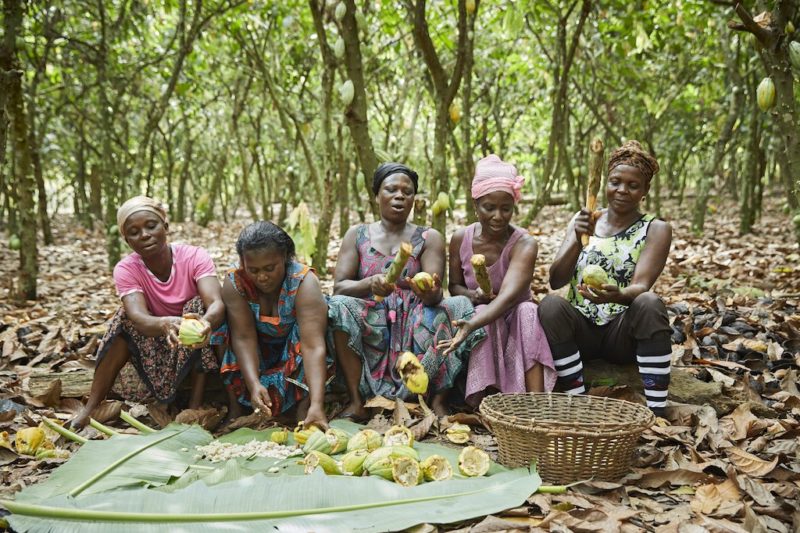Exclusive: Ivory Coast cocoa farmers remain concerned over comparatively low crop payments

cocoa farming in West Africa (pic Olam)
The Ivory Coast has released the latest prices to be paid to cocoa farmers in the region that have prompted concerns from within the industry that has sparked concern from market observers that rates remain significantly below global and neighbouring country prices, writes Neill Barston.
According to official government communications, farming co-operatives will now be paid $3.2 per kg (equivalent to $3,200 per tonne), for the main season crops, and a minimum of $3.03 per kg for individual farm gate prices. This stands against commodities prices being achieved in New York and London markets of at least $7,000 per tonne this month – with prices having peaked earlier this April at $12,000 a tonne.
As previously reported by Confectionery Production, the existing model of cocoa sales for the region has been on the basis of advance sales, with cocoa in the main, being traded a year ahead of production, which is at the core of the commodities trading platforms operation.
However, for many market observers, including in the view of farmer unions in West Africa, this has created an imbalance in the system, where commodities traders stand to gain major profits in an upward market cycle as has been the case, with farmers seeing a far lesser share of those inflated values (gaining around a fifth of those prices) in many instances within Ghana and Ivory Coast.
Consequently, as previously reported, the comparatively low pay to farmers in both Ivory Coast and Ghana (which was raised earlier this summer in the wake of major price spikes, but still far below international commodities values), has led to a persistent problem of cocoa smuggling to neighbouring African countries where cocoa has commanded higher prices.
Ange-Laurent Gnagne, of the Ivory Coast Cocoa Cooperative (Scoopega-Scoops), noted that pricing disparity between prices attained by Ivory Coast farmers was of significant concern, as the issue remains at the heart of agricultural communities being able to earn a living income.
He said: “Clearly, the current pricing gap between Ivory Coast and the world is a problem to most of the farmers in Ivory Coast. We do not understand why Ivory Coast and Ghana have not been able to raise their prices significantly, while the current rise on prices on the international market allows it.”
As previously reported, many farmers within the region remain on wages well below $2 a day, less than globally defined poverty levels, meaning they have been unable save and invest into many agricultural inputs including fertilisers and more disease-resistant crop strains.
This situation has been compounded by further poor harvests over the past two or three years, with the region impacted by climate change that has further affected crops with greater instances of lost yields due to conditions, as well as increasing cases of several core diseases affecting cocoa including the swollen-shoot virus that have contributed to shortages of supplies.
Furthermore, the prospect of the EUDR regulation introduction that had been scheduled for the end of this year, ensuring companies prove their supply chains were deforestation-free, had also caused considerable concern for farming groups – as no clarity had been provided as to whether they were expected to foot the cost of monitoring these new guidelines at farm-level. The scheme is now subjected to an anticipated 12-month delay, as a number of issues surrounding its implementation are resolved – namely in selecting monitoring bodies and how the legislation will be interpreted on the ground.
Ghana situation
Meanwhile, in neighbouring Ghana, which has in general commanded slightly higher prices for much of its cocoa, which according to regional sources, considered to be in many instances of a higher grade, has faced a similar situation.
The country marked international cocoa day at the start of the month, and its national industry authority, Cocobod stated that it has reaffirmed its position of supporting sustainable production methods, as well as driving towards improving the livelihoods of farmers in the sector.
Under a banner of “Sustaining Cocoa for Future Generations,” the organisation has asserted that there was a shared responsibility of all stakeholders – farmers, government agencies, industry partners, and consumers – to promote ethical practices in cocoa cultivation, marketing, and processing.
In a statement, it said: “Cocobod emphasises the urgent need for collective national action to safeguard the integrity of Ghana’s cocoa industry. We call on all Ghanaians to unite in the fight against illegal mining and cocoa smuggling, two significant threats to the sector’s sustainability.
“Illegal mining continues to degrade farmlands, compromising the very foundation of cocoa farming, while cocoa smuggling undermines the financial returns and long-term viability of the industry by depriving farmers and the nation of rightful earnings from substantial investments in cocoa production.”



